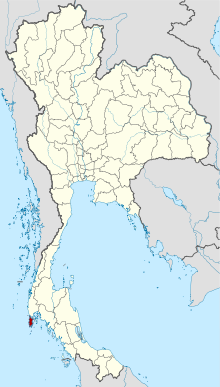
Back Propinsi Phuket ACE محافظة بوكيت Arabic Propinsi Phuket BAN Пхукет Byelorussian Bukit (Muang-Tay) BEW Пукет Bulgarian ফুকেত প্রদেশ Bengali/Bangla চাংৱাত ফুকেত BPY Província de Phuket Catalan Phuket Hū CDO
This article is written like a manual or guide. (June 2022) |
Phuket
ภูเก็ต | |
|---|---|
| Other transcription(s) | |
| • Southern Thai | ภูเก็ต (pronounced [pʰûː.két̚]) |
| • Malay | Bukit (Rumi) بوکيت (Jawi) |
| • Hokkien | 普吉 Phóo-kiat (Tâi-lô) |
 Phuket viewpoint | |
| Nickname(s): Junk Ceylon Thalang | |
| Motto(s): ไข่มุกอันดามัน สวรรค์เมืองใต้ หาดทรายสีทอง สองวีรสตรี บารมีหลวงพ่อแช่ม ("Pearl of the Andaman. Heavenly City of the South. Golden beaches. Two heroines. Virtue of Luang Pho Chaem.") | |
 Map of Thailand highlighting Phuket province | |
| Country | Thailand |
| Capital | Phuket (city) |
| Government | |
| • Governor | Narong Woonsiew (Since 15 Jun 2020)[1] |
| Area | |
| • Total | 543 km2 (210 sq mi) |
| • Rank | Ranked 76th |
| Population (2019)[3] | |
| • Total | 416,582 |
| • Rank | Ranked 63rd |
| • Density | 755/km2 (1,960/sq mi) |
| • Rank | Ranked 4th |
| Human Achievement Index | |
| • HAI (2022) | 0.6399 "average" Ranked 41st |
| GDP | |
| • Total | baht 209 billion (US$7.5 billion) (2019) |
| Time zone | UTC+7 (ICT) |
| Postal code | 83xxx |
| Calling code | 076 |
| ISO 3166 code | TH-83 |
| Website | phuket.go.th |
Phuket /ˌpuːˈkɛt/; Thai: ภูเก็ต, [pʰūː.kèt] , Malay: Bukit or Tongkah is one of the southern provinces (changwat) of Thailand. It consists of the island of Phuket, the country's largest island, and another 32 smaller islands off its coast.[6] Phuket lies off the west coast of mainland Thailand in the Andaman Sea. Phuket Island is connected by the Sarasin Bridge to Phang Nga province to the north. The next nearest province is Krabi, to the east across Phang Nga Bay.
Phuket province, encompassing an area of 576 km2 (222 sq mi), ranks as the second-smallest province in Thailand. Its size is comparable to, albeit slightly smaller than, that of Singapore. Historically, Phuket Island was situated on a major trading route between India and China. This strategic location led to its frequent mention in the logs of foreign ships, including those from Portugal, France, the Netherlands, and England. Despite this attention from various European powers, Phuket was never colonized by any European nation.
Economically, the province's wealth was initially derived from tin and rubber production. In more recent times, Phuket has transitioned to tourism as its primary source of income. More than 100,000 foreigners are estimated to have settled in Phuket.[7]
- ^ "ประกาศสำนักนายกรัฐมนตรี เรื่อง แต่งตั้งข้าราชการพลเรือนสามัญ" [Announcement of the Prime Minister's Office regarding the appointment of civil servants] (PDF). Royal Thai Government Gazette. 137 (Special 142 Ngor). 3. 17 June 2020. Archived from the original (PDF) on June 17, 2020. Retrieved 13 April 2021.
- ^ Advancing Human Development through the ASEAN Community, Thailand Human Development Report 2014, table 0:Basic Data (PDF) (Report). United Nations Development Programme (UNDP) Thailand. pp. 134–135. ISBN 978-974-680-368-7. Retrieved 17 January 2016, Data has been supplied by Land Development Department, Ministry of Agriculture and Cooperatives, at Wayback Machine.
{{cite report}}: CS1 maint: postscript (link)[dead link] - ^ "รายงานสถิติจำนวนประชากรและบ้านประจำปี พ.ศ.2561" [Statistics, population and house statistics for the year 2018]. Registration Office Department of the Interior, Ministry of the Interior (in Thai). 31 December 2018. Retrieved 20 June 2019.
- ^ "ข้อมูลสถิติดัชนีความก้าวหน้าของคน ปี 2565 (PDF)" [Human Achievement Index Databook year 2022 (PDF)]. Office of the National Economic and Social Development Council (NESDC) (in Thai). Retrieved 12 March 2024, page 55
{{cite web}}: CS1 maint: postscript (link) - ^ "Gross Regional and Provincial Product, 2019 Edition". <>. Office of the National Economic and Social Development Council (NESDC). July 2019. ISSN 1686-0799. Retrieved 22 January 2020.
- ^ Cite error: The named reference
TATwas invoked but never defined (see the help page). - ^ Ng, Kelly (7 March 2024). "Thailand revokes visa of Swiss man who allegedly assaulted local woman". BBC News.

